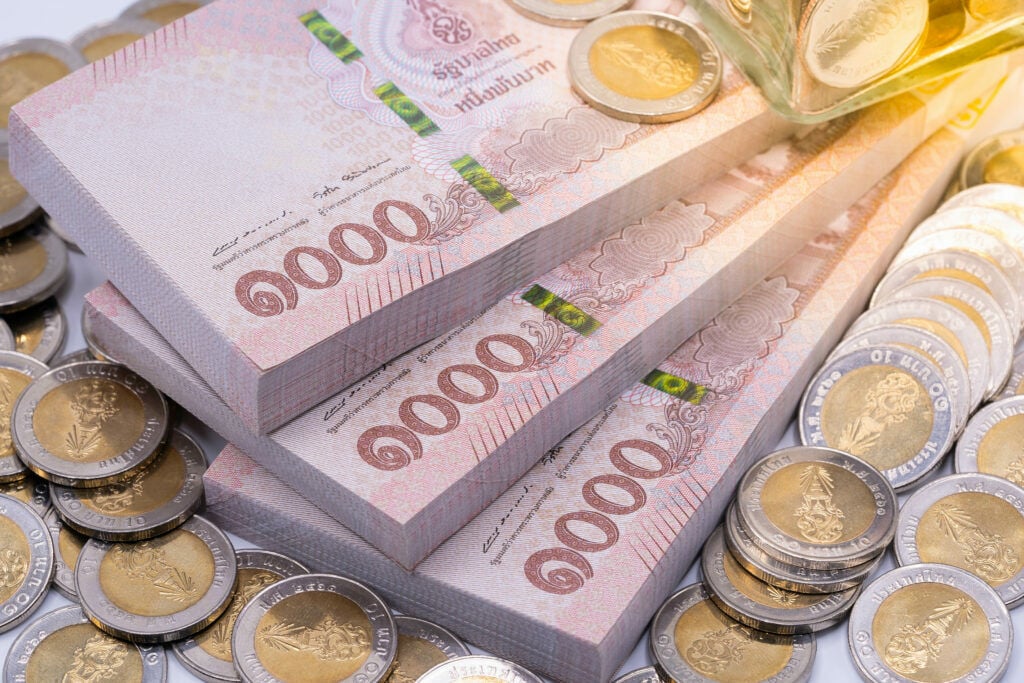Thai baht to fall to 35.50 against US dollar by 2025

Kasikorn Research Centre (K-Research) forecasts that the Thai baht will depreciate, reaching 34.50 to the US dollar by the end of this year and sliding further to 35.50 in 2025. This prediction comes as new US government policies are expected to exert pressure on the Chinese yuan next year.
The baht recently hit a three-month low of 34.61 against the greenback during early trading, following a close of 34.20 the previous day. This depreciation occurred as the US dollar and bond yields gained strength after the Federal Reserve implemented a 25 basis points interest rate cut overnight.
The Bank of Thailand’s Monetary Policy Committee has maintained its policy rates at 2.25% as of December 18.
According to Kanjana Chockpisansin, head of research in the banking and financial sector at K-Research, “Even though the Fed cut rates to 4.25 to 4.50%, a two-year low as anticipated by the market, a hawkish statement from the central bank and an upgrade of the US’s 2025 economic growth forecast bolstered sentiment for the dollar, causing Asian currencies, including the baht, to weaken against it.”
Federal Reserve officials now anticipate only two rate cuts next year, a reduction from the four they projected in September. In response, the Thai market expects two rate cuts in 2025, according to Kanjana.
“Trends now support dollar strengthening, pressuring the baht to continue depreciating against the US currency.”
K-Research maintains its outlook for the Thai exchange rate to be 34.50 baht to the dollar by the end of 2024.
Thai baht
The baht has weakened by 1.2% year-to-date, moving from 34.14 baht to the dollar at the end of 2023. During the same period, the Chinese yuan and Japanese yen depreciated by 2.7% and 9.3%, respectively.
The South Korean won experienced the greatest loss at 11% while the Malaysian ringgit was the sole Asian currency to appreciate against the greenback, with a 2% increase.
Looking ahead to next year, Kanjana noted that the yuan is likely to depreciate in line with the slowing Chinese economy. Chinese officials recently indicated they may allow the yuan to weaken in 2025 in anticipation of higher US trade tariffs as Donald Trump returns to the White House.
K-Research anticipates that yuan movements will continue to pressure the baht, predicting it will finish at 35.50 to the dollar by the end of 2025.
Asian stocks, including those in Thailand, declined yesterday, December 19, after the Fed projected fewer interest rate cuts next year. The yen weakened beyond the critical level of 155 to the dollar as the Bank of Japan decided not to raise borrowing costs in its meeting early yesterday.
Meanwhile, gold prices fell to nearly US$2,600 per ounce, while Bitcoin remained stable above US$100,000.
Pipat Luengnaruemitchai, an economist for emerging Asia at BofA Securities, foresees three 25 basis points cuts by the Bank of Thailand in 2025, beginning in the second quarter, which would bring the policy rate down to levels seen between 2015 and 2018, reported Bangkok Post.
“We maintain our view that the monetary policy stance is too tight, considering the inflation rate. Rate cuts could ease financial conditions, given loan growth contraction, rising asset quality, and the weakening of domestic demand.”
Latest Thailand News
Follow The Thaiger on Google News:


























